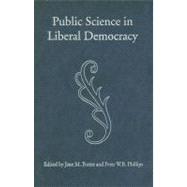
Note: Supplemental materials are not guaranteed with Rental or Used book purchases.
Purchase Benefits
Looking to rent a book? Rent Public Science in Liberal Democracy [ISBN: 9780802093592] for the semester, quarter, and short term or search our site for other textbooks by Porter, Jene M.; Phillips, Peter W. B.. Renting a textbook can save you up to 90% from the cost of buying.
| Preface | p. ix |
| Abbreviations | p. xi |
| Introduction: The History, Philosophy, and Practice of Public Science | p. 3 |
| The History of Public Science in Theory and Practice | |
| The Element Publicum | p. 23 |
| Science, Democracy, and Philosophy: From Marginal Achievements to Impossible Opportunities | p. 40 |
| Public Geoscience at the Frontiers of Democracy | p. 60 |
| Public Science, Society, and the Greenhouse Gas Debate | p. 84 |
| Solutions to the Problems: Philosophic | |
| The Role of Humanities Policy in Public Science | p. 111 |
| Science Studies Encounter with Public Science: Mertonian Norms, the Local Life of Science, and the Long Dure | p. 121 |
| The Democratic Deficit of Science and Its Possible Remedies | p. 135 |
| New Atlantis Reconsidered | p. 149 |
| Expertise, Common Sense, and the Atkins Diet | p. 174 |
| The Role of the Public Academic Scientist in the Twenty-first Century: Who Is Protecting the Public Interest? | p. 194 |
| The Science Literacy Gap: Enabling Society to Critically Evaluate New Scientific Developments | p. 205 |
| Solutions to the Problems: Institutional | |
| Science and Policymaking: The Legitimation Conundrum | p. 215 |
| Bringing Balance, Disclosure, and Due Diligence into Science-Based Policymaking | p. 239 |
| Technoscience in an 'Illiberal' Democracy: The Internet and Genomics in Singapore | p. 264 |
| Retaining Scientific Excellence in Setting Research Priorities: Lessons from the Consultative Group on International Agricultural Research (CGIAR) | p. 278 |
| Toward Centres for Responsible Innovation in the Commercialized University | p. 295 |
| Citizens and Biotechnology | p. 313 |
| Contributors | p. 335 |
| Table of Contents provided by Ingram. All Rights Reserved. |
The New copy of this book will include any supplemental materials advertised. Please check the title of the book to determine if it should include any access cards, study guides, lab manuals, CDs, etc.
The Used, Rental and eBook copies of this book are not guaranteed to include any supplemental materials. Typically, only the book itself is included. This is true even if the title states it includes any access cards, study guides, lab manuals, CDs, etc.